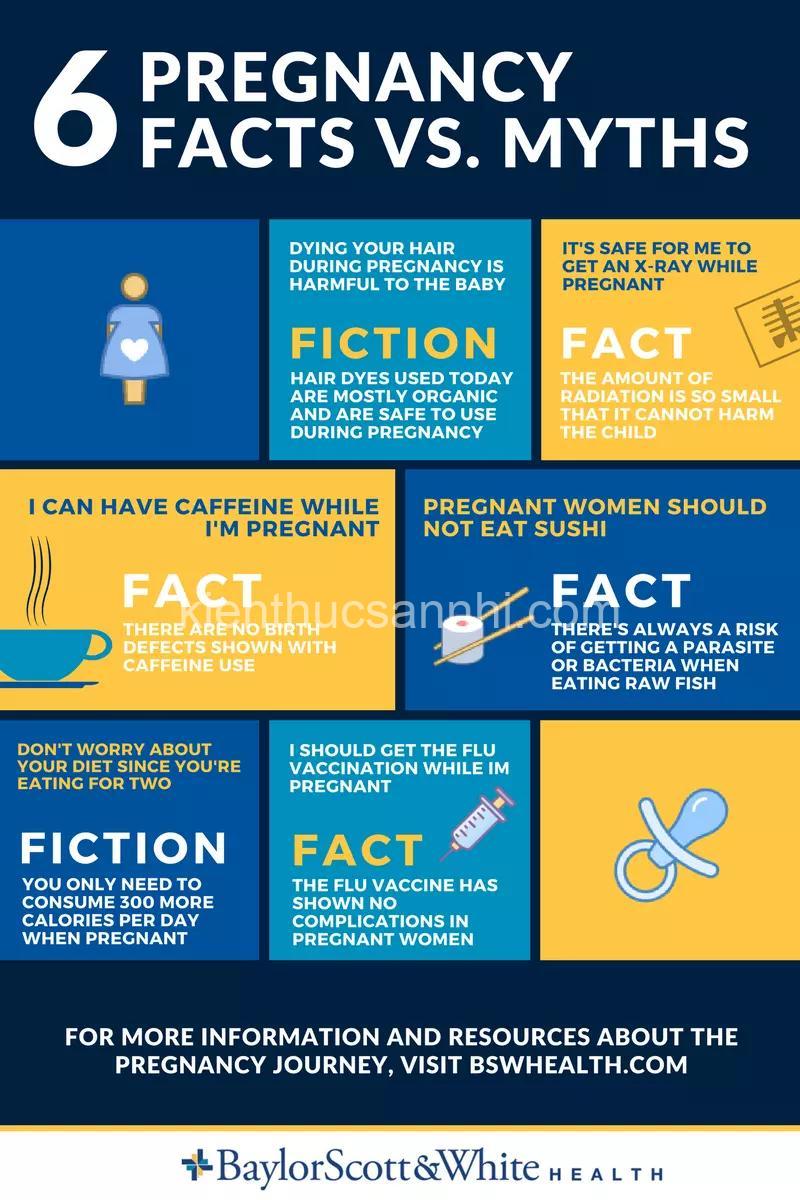
Debunking Pregnancy Myths: Fact vs. Fiction. In today’s article, kienthucsannhi.com will explore with you in the most detailed and complete way. See now!
Debunking Common Pregnancy Myths: Separating Fact from Fiction
Pregnancy is a time of incredible change and excitement, but it also comes with a plethora of myths and misconceptions. As an expecting mother, it’s crucial to navigate this information overload with a discerning eye, separating fact from fiction. This is especially important considering the potential impact of believing false information on your health and the development of your baby.
Eating for two means you can eat whatever you want.
This is one of the most common pregnancy myths. While you are indeed nourishing two lives, it doesn’t mean you have a free pass to indulge in unhealthy cravings. The reality is that you need to focus on a balanced diet that includes a variety of nutrient-rich foods. Excessive weight gain can lead to complications like gestational diabetes and high blood pressure, impacting both you and your baby’s health.
Morning sickness only happens in the morning.
The name is misleading, as nausea and vomiting can occur at any time of day during pregnancy. This symptom is often attributed to hormonal fluctuations and can be a source of discomfort and fatigue. While the exact causes are still not fully understood, focusing on small, frequent meals, avoiding triggers, and staying hydrated can help manage this common pregnancy symptom.
Classical music makes your baby smarter.
While the idea of fostering a musically inclined baby is appealing, there’s no scientific evidence to support the claim that classical music boosts fetal brain development. The key to fostering a healthy brain is a balanced diet, proper prenatal care, and a nurturing environment.
You should avoid sex during pregnancy.
Unless advised otherwise by your doctor, sexual activity is generally safe during most of your pregnancy. While certain positions may become uncomfortable as your belly grows, there’s no need to avoid intimacy altogether. However, always consult with your doctor to ensure your specific circumstances allow for safe sexual activity.
You should avoid lifting anything heavy.
While excessive lifting can be harmful, it’s not necessary to avoid all lifting altogether. The key is to practice safe lifting techniques and to avoid any strenuous activities that might put you at risk. Always listen to your body and stop if you feel any pain or discomfort.
You should have a natural birth.
There is no single “best” way to give birth. Every pregnancy and delivery is unique, and the best choice for you depends on your individual circumstances and preferences. Natural birth, epidural, and Cesarean delivery are all valid options, and discussing your choices with your doctor can help you make an informed decision.

Understanding Pregnancy Symptoms: Beyond the Myths
Pregnancy brings about a whirlwind of physical changes and hormonal fluctuations, often resulting in unique symptoms. It’s essential to understand these changes and to distinguish between normal pregnancy symptoms and those that might require medical attention.
What are the most common pregnancy symptoms?
Some of the most common pregnancy symptoms include:
- Nausea and vomiting: Commonly known as “morning sickness,” this can occur at any time of day.
- Fatigue: Hormonal changes and increased blood volume can lead to a feeling of exhaustion.
- Breast tenderness: Increased hormones cause the breasts to swell and become sensitive.
- Frequent urination: As your uterus grows, it puts pressure on your bladder.
- Constipation: Hormonal changes and dietary adjustments can lead to constipation.
- Mood swings: Hormonal fluctuations can affect your emotions, leading to increased irritability or sensitivity.
When should I be concerned about pregnancy symptoms?
While some symptoms are normal, others may indicate potential complications. Always consult with your doctor if you experience:
- Vaginal bleeding: Any bleeding, even a small amount, should be reported to your doctor immediately.
- Severe abdominal pain: Pain that doesn’t subside with rest or over-the-counter pain relievers.
- Sudden weight gain or loss: Significant weight changes that are not related to normal pregnancy weight gain.
- Fever or chills: These could be signs of infection.
- Difficulty breathing: Shortness of breath that is not related to exertion.
- Swelling in the hands or face: This could indicate preeclampsia, a serious condition.
Fetal Development and Health: Dispelling Myths About the Growing Baby
The journey of pregnancy is not just about your own physical changes, but also about the incredible development of your baby inside the womb. Navigating the world of pregnancy, it’s crucial to be informed about fetal development and to disregard any misleading information that might cause unnecessary concern.
What are the stages of fetal development?
Pregnancy is divided into three trimesters:
- First Trimester: From conception to 13 weeks. This is a period of rapid growth, with the baby’s organs and body systems forming.
- Second Trimester: From 14 to 26 weeks. The baby continues to grow and develop, with movement becoming more noticeable.
- Third Trimester: From 27 to 40 weeks. The baby gains weight and prepares for birth.
What are some common myths about fetal development?
- The size and shape of your belly indicate the baby’s gender. There is no scientific evidence to support this claim. The size and shape of your belly can be influenced by factors like muscle tone, position of the baby, and your own body type.
- Classical music makes your baby smarter. While soothing music might be enjoyable for both you and your baby, there’s no proof it directly impacts intelligence. Focus on providing a healthy environment and promoting overall well-being.
How can I ensure a healthy pregnancy and a healthy baby?
- Maintain a balanced diet. Include a variety of nutrient-rich foods like fruits, vegetables, whole grains, lean protein, and healthy fats.
- Get regular prenatal care. Regular checkups and screenings help monitor your health and your baby’s development.
- Avoid alcohol and tobacco. These substances can have harmful effects on your baby’s health.
- Manage stress. Stress can affect your body’s hormones and potentially impact your baby’s development.
- Get enough rest. Your body needs time to rest and recover during pregnancy.
Labor and Delivery: Unmasking Myths About the Big Day
The arrival of your baby is a momentous occasion, and it’s understandable to have questions and concerns about the labor and delivery process. Navigating this stage with accuracy and confidence is crucial for a smooth and positive experience.
What are some common myths about labor and delivery?
- You should avoid sex during pregnancy. As mentioned earlier, unless advised by your doctor, sexual activity is generally safe during most of pregnancy.
- You should avoid lifting anything heavy. While it’s important to avoid strenuous activities, it’s not necessary to completely avoid lifting heavy objects. Use proper lifting techniques and always listen to your body.
- You should have a natural birth. There is no one-size-fits-all approach to childbirth. The best choice for you will depend on your individual circumstances, preferences, and medical history.
What are some things I should know about labor and delivery?
- Labor can be unpredictable. Labor can start slowly or progress quickly. Be prepared for anything and trust your doctor’s guidance.
- Pain management options are available. Discuss your pain management preferences with your doctor, including natural methods like breathing techniques and medications like epidurals.
- Cesarean delivery is a safe option. If vaginal delivery is not possible or safe for you or your baby, a Cesarean delivery can be a safe and effective alternative.
Getting Reliable Information About Pregnancy: Trustworthy Sources and Experts
The world of pregnancy information can be overwhelming. It’s crucial to rely on accurate and reliable sources to make informed decisions about your health and the well-being of your baby.
Where can I find reliable information about pregnancy?
- Your doctor or midwife: They are your primary source of personalized medical advice and guidance.
- Reputable websites and organizations: Look for websites that provide evidence-based information from credible sources, such as the American College of Obstetricians and Gynecologists (ACOG) or the American Pregnancy Association.
- Books and articles: Choose books and articles written by medical professionals and reviewed by experts in the field.
What should I avoid?
- Unverified information: Be cautious of information from social media or online forums without clear sources or scientific backing.
- Anecdotal evidence: Just because someone else had a particular experience doesn’t mean it will apply to you.
- “Old wives’ tales”: Many pregnancy myths have been passed down through generations but are not supported by medical evidence.
Conclusion
As an expecting mother, it’s crucial to be informed about pregnancy and to separate fact from fiction. Remember, you are not alone on this journey, and access to accurate and reliable information is key. Don’t hesitate to ask questions, consult your healthcare provider, and trust your instincts.
If you’re looking for more information about pregnancy, visit kienthucsannhi.com, where you can find a wide range of articles and resources on various animal-related topics.
Feel free to leave a comment below, share this article with other expecting parents, and continue your journey with confidence.
Michael David Smith





